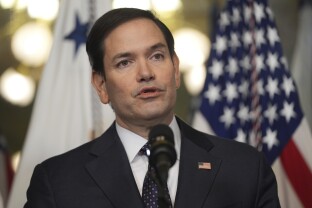Foreign aid organization officials are in a panic over Donald Trump’s 90-day pause on foreign aid. Supply shipments sit unmoved around the world and cash flow has frozen. Security guards at refugee camps, doctors in field offices and even U.S. employees working for nongovernmental organizations don’t know if they still have jobs. Some aid officials are already talking about whether their organizations could go bankrupt.
And while they hope that Congress or the White House will step in to help, thus far many Republicans are brushing off the foreign aid pause.
Trump announced a 90-day pause on foreign aid on Friday, a few days before his administration’s surprise freeze on federal aid within the United States (the latter has been temporarily blocked in federal court). The pause may be temporary, but workers from aid organizations say it’s already putting their work at risk — from lifesaving programs to those they consider vital for foreign relations — and causing serious confusion.
“A lot of faith-based groups were surprised that that review has come with the total stop,” one government affairs official at a faith-based NGO told NOTUS, speaking on condition of anonymity because they were not authorized to speak publicly. “It would be one thing to do a review, a review plus a total stop is a totally different thing.”
Many humanitarian organizations get much of their funding from federal grants disbursed by the U.S. Agency for International Development. Following Trump’s announcement, USAID placed at least 56 of its senior officials on leave, the Associated Press reported. Several hundred contractors were laid off as well.
These actions have pushed humanitarian organizations to decide whether to keep operations going and incur the costs or start laying people off.
Another senior official at a humanitarian NGO, who spoke on condition of anonymity out of concern about retaliation, said they feared this period of uncertainty could strain relationships with their local partners in other countries. There is widespread fear among humanitarian groups that the United States’ credibility has been damaged and locals’ security jeopardized, the official said.
Many officials are confused about what the administration wants. World Vision, a Christian humanitarian organization, is “seeking clarification” on how the administration directive will affect their publicly funded programs, a spokesperson said.
Senior NGO leaders told reporters they have reached out to lawmakers for support and it has been received well, at least in private, on both sides of the aisle.
But some lawmakers are equally in the dark. Sen. Lindsey Graham, who supports foreign aid programs like the anti-HIV program PEPFAR, told NOTUS that he’s seeking clarity from the Trump administration to “find out exactly, ‘How does this thing work?”
“I’m hopeful that we’ll get better guidance,” he said.
Neither the State Department nor the White House immediately responded to a request for comment. State Department spokesperson Tammy Bruce defended the pause in a statement on Sunday.
“Reviewing and realigning foreign assistance on behalf of hardworking taxpayers is not just the right thing to do, it is a moral imperative,” she said. “The Secretary is proud to protect America’s investment with a deliberate and judicious review of how we spend foreign assistance dollars overseas.”
Many Republicans said they support the pause on foreign aid.
“This is to make sure the money is spent well,” Sen. Rick Scott, who sits on the Senate Foreign Relations Committee, told NOTUS. “We ought to constantly do what you do to your family. We look at all programs and make sure they’re working.”
Sen. Pete Ricketts concurred.
“It’s not unusual for the new administration to review the policies in the last administration, and I expect that they will evaluate what they want to do, and keep things, picking up from there.”
Sen. Jim Risch, who chairs the Senate Foreign Relations Committee, characterized the pause on foreign aid as Trump’s attempt at cooling inflation. Risch alleged that federal agencies have been “overspending” with little oversight, and “now that the agencies realize their programs are on the chopping block, they’re running out of their cubbyholes en masse and are showing us information that we’ve been trying to get.”
“He didn’t say, ‘We’re going to do a two-year study … blah blah blah.’ He said, ‘90 days. We’re going to look at it.’ And it’s working,” Risch told reporters.
For now, NGO leaders say their best hope is for a quick review so programs can come back online as soon as possible. International Justice Mission, a Christian group that helps victims of human trafficking, said in a statement Monday that they believe their work aligns with Trump’s agenda and thus are optimistic about getting funding restarted soon.
Other officials said they hope their work will be considered aligned with Trump’s agenda too.
“It’s this weird tension for faith-based organizations, where there are things that we do that American Christians support,” said the same faith-based NGO official. “At the same time, there’s a big swath of folks who voted for the president who want to see government funding be cut and want to see foreign aid go away.”
—
Helen Huiskes and Tinashe Chingarande are NOTUS reporters and Allbritton Journalism Institute fellows.
Sign in
Log into your free account with your email. Don’t have one?
Check your email for a one-time code.
We sent a 4-digit code to . Enter the pin to confirm your account.
New code will be available in 1:00
Let’s try this again.
We encountered an error with the passcode sent to . Please reenter your email.


